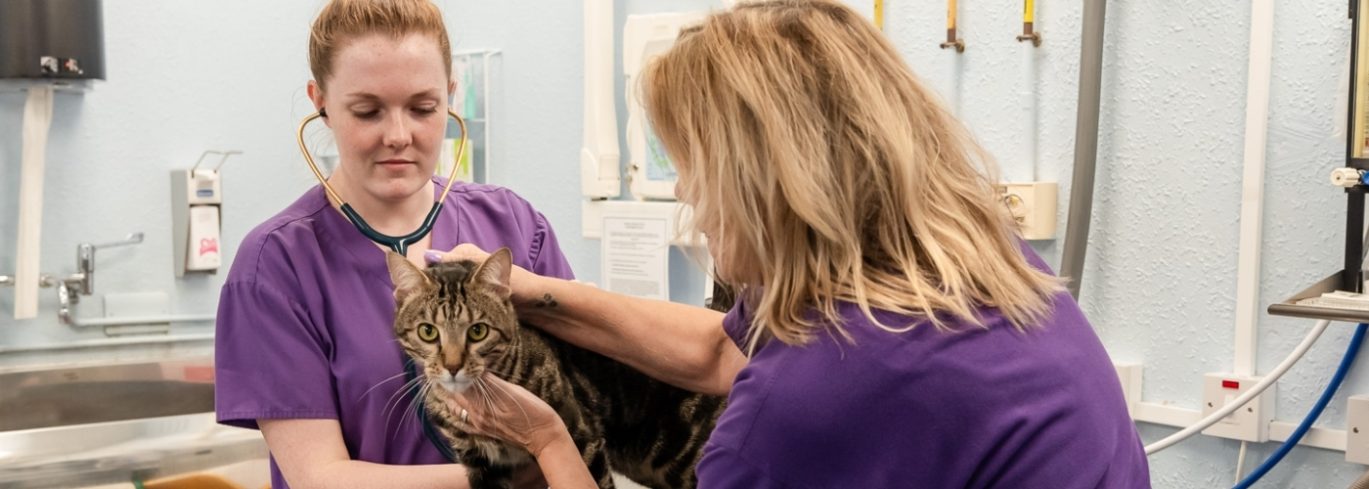
Cat Vet Care
When does your cat need to see a vet? We answer your questions below.
On this page:
Owners have a duty of care towards their pets. This means you are responsible for ensuring your cat is happy and healthy by protecting them from pain, suffering, injury and disease.
Cats can hide signs of illness and pain well. It is important to pay attention to your cat’s behaviour and check them over regularly. Whilst there are things you can do at home to keep your cat healthy, you must consult your vet immediately if you notice any abnormalities.
You might also be interesting in our pages about general cat advice, getting a cat, cat vet care and litter training.
Vaccinations
Kittens require vaccinations at around eight weeks old. They will then need a follow up vaccination three or four weeks later. If the breeder has not already done this, you will need to arrange to have them vaccinated. We’d also recommend getting a check up to ensure there are no obvious health problems.
We would always recommend keeping up to date with booster vaccinations as advised by your vet to protect your cat against deadly diseases.
Worm, flea and tick treatment
If your cat has outdoor access, it’s important to also provide preventative treatment against worms, ticks and fleas on a regular basis, usually monthly. If your cat stays indoors but visits a cattery or you have other pets who spend time outdoors, it’s worth ensuring they are treated to prevent parasites being passed on by other animals or humans. Your vet will be able to recommend treatments which suit your cat’s size and lifestyle as well your budget.
Treatments
Some treatments can be costly so please do your research and ask your vet to recommend a range of suitable treatments. Many even offer a subscription service to prevent missing a dose. These preventative treatments can be administered at home and usually come in the form of a liquid solution which is applied to the back of the neck. You may find it easier to have someone helping you. Alternatively, they can also come in tablet form, which can be hidden in food.
If you see live fleas, worms or ticks on your cat, speak to your vet right away about treatment. It is possible for preventative measures to lose effectiveness, for example, if your cat gains or loses weight.
Avoid products which contain permethrin and never use a treatments designed for dogs or other animals.
Microchipping
The Scottish SPCA is actively campaigning to make microchipping a legal requirement for cat owners so we would strongly advise you to do so. The UK Government recently announced that it would become compulsory for cats in England to be microchipped from June 2024. We are urging the Scottish Government to implement the same law in Scotland.
Why microchip your cat?
Microchipping is the most effective way to increase the chances of a reunion should your cat ever go missing. It is a quick procedure that provides pets with a unique identification code, making it easier to trace and contact their owner. If your details should ever change, such as your address or phone number, these can be updated via an online database, sometimes for a fee. Microchipping can also help to resolve ownership disputes.
Cats can be microchipped from as young as eight weeks old. When you adopt a cat from us, they will be microchipped. Microchipping should only be carried out by a trained professional.
Neutering
Neutering is a common surgical procedure which stops your pet from being able to breed and to avoid unwanted litters.
Male cats
Neutering male cats involves the removal of both testicles. This not only prevents accidental litters but can also help to reduce roaming behaviour, competition with other males, and spraying behaviour.
Female cats
Spaying is the term used for neutering female cats. It involves removing the ovaries and usually the uterus. This procedure prevents unwanted litters.
When to neuter
Cats should be neutered before they reach sexual maturity, which is typically around four months old. Every cat adopted from us will be neutered unless they are too young or a vet has advised against the procedure. If they are too small at the time of adoption, we will issue a voucher to have the procedure carried out at a later date. Female cats can get pregnant as young as four months. Even if a cat is kept indoors, there is still a risk that they will escape and get pregnant. Female cats who are not spayed will come into season every few weeks which is uncomfortable and frustrating for them.
If you’re concerned about the cost of neutering, please call 03000 999 999 for advice on financial assistance programs available to you or our low-cost neutering scheme.

Support us from £5 a month
It costs us £63,000 every day to continue the work that animals across Scotland depend on. Our work is only possible because of the generosity of people like you.
